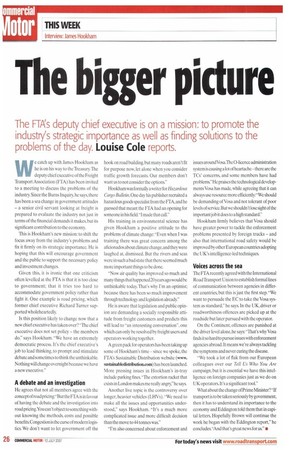The bigger picture
Page 26

If you've noticed an error in this article please click here to report it so we can fix it.
The FTAs deputy chief executive is on a mission: to promote the industry's strategic importance as well as finding solutions to the problems of the day. Louise Cole reports.
We catch up with James Hookham as he is on his way to the Treasury.The deputy chief executive of the Freight Transport Association (FTA) has been invited to a meeting to discuss the problems of the industry Since the Burns Inquiry, he says, there has been a sea change in government attitudes —a senior civil servant looking at freight is prepared to evaluate the industry not just in terms of the financial demands it makes, but its significant contribution to the economy.
This is Hookham's new mission: to shift the focus away from the industry's problems and fix it firmly on its strategic importance. He is hoping that this will encourage government and the public to support the necessary policy and investment changes.
Given this, it is ironic that one criticism often levelled at the FTA is that it is too close to government; that it tries too hard to accommodate government policy rather than fight it. One example is road pricing, which former chief executive Richard Turner supported wholeheartedly.
Is this position likely to change now that a new chief executive has taken over? "The chief executive does not set policy — the members do." says Hookham. "We have an extremely democratic process. It's the chief executive's job to lead thinking, to prompt and stimulate debate and sometimes to think the unthinkable. Nothing will change overnight because we have a new executive."
A debate and an investigation
He agrees that not all members agree with the concept of road pricing:"But the PTA is in favour of having the debate and the investigation into road pricing.You can't object to something without knowing the methods, costs and possible benefits. Congestion is the curse of modemlogistics. We don't want to let government off the hook on road building, but many roads aren't fit for purpose now, let alone when you consider traffic growth forecasts. Our members don't want us to not consider the options."
Hookham was fortnally a writer for Hazardous Cargo Bulletin, One day his publisher recruited a hazardous goods specialist from the FTA, and he guessed that meant the PTA had an opening for someone in his field."I made that call."
His training in environmental science has given Hookham a positive attitude to the problems of climate change: "Even when I was training there was great concern among the aficionados about climate change. and they were laughed at, dismissed. But the rivers and seas were in such a had state that there seemed much more important things toile done.
"Now air quality has improved so much and many things that happened 20 years ago would be unthinkable today. That's why I'm an optimist; because there has been so much improvement through technology and legislation already" He is aware that legislation and public opinion are demanding a socially responsible attitude from freight customers and predicts this will lead to "an interesting conversation", one which can only be resolved by freight users and operators working together.
A green pack for operators has been taking up some of Hookham's time — since we spoke, the PTA's Sustainable Distribution website (www. sustainabledisAribution.com) has been launched. More pressing issues in Hookham's in-tray include parking fines. "The extortion racket that exists in London makes me really angry," he says.
Another live topic is the controversy over longer, heavier vehicles (LHVs). "We need to make all the issues and opportunities understood," says Hookham. "it's a much more complicated issue and more difficult decision than the move to 44 tonnes was."
"I'm also concerned about enforcement and issues around Vosa.The 0-licence administration system is causing a lot of heartache— there are the TC.s' concerns, and some members have had problems."He praises the technological developments Vosa has made, while agreeing that it can always use resource more efficiently:"We should be demanding of Vosa and not tolerant of poor levels of service. But we shouldn't lose sight of the important job it does to a high standard."
Hookham firmly believes that Vosa should have greater power to tackle the enforcement problems presented by foreign trucks — and also that international road safety would be improved by other European countries adopting the UK's intelligence-led techniques.
Voices across the sea
The PTA recently agreed with the International Road Transport Union to establish formal lines of communication between agencies in different countries, but this is just the first step. "We want to persuade the EC to take the Vosa system as standard," he says. In the UK, driver or roadworthiness offences are picked up at the roadside but later pursued with the operator.
On the Continent, offences are punished at the driver level alone, he says: "That's why Vosa finds it so hard to pursue issues with enforcement agencies abroad. It means we're always tackling the symptoms and never curing the disease.
"We took a lot of flak from our European colleagues over our Tell Us Who You Are campaign, but it is essential we have this intelligence on foreign companies just as we do on UK operators. It's a significant tool."
What about the change of Prime Minister? "If transport is to be taken seriously by government, then it has to understand its importance to the economy and Eddington told them that in capital letters. Hopefully Brown will continue the work he began with the Eddington report," he concludes. "And that's great news for us." •
























































































































































































